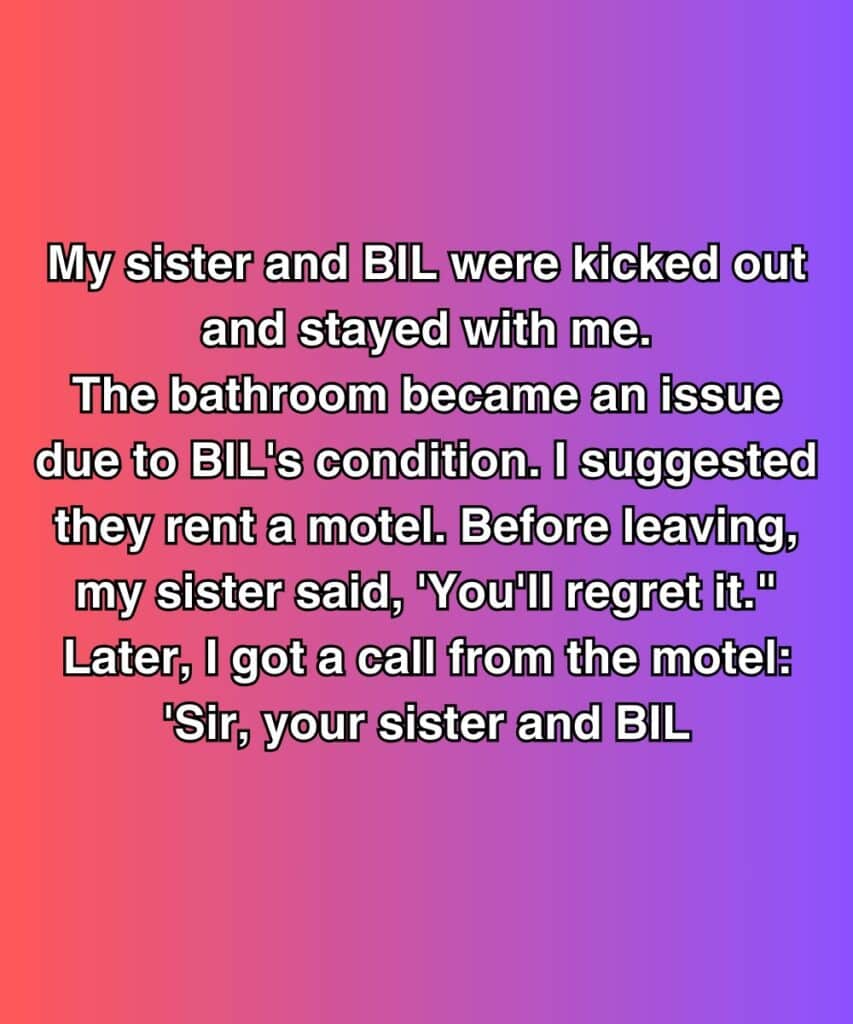My sister and her husband got kicked out of their place and landed on my doorstep.
I said yes because… family. Two bedrooms, one bathroom, and I like things tidy. Still, I cleared the spare room, stocked the fridge, even ordered a raised toilet seat so Raj—my brother-in-law—could manage. His new neurological condition had wrecked his coordination and bladder control. He’d lost his job. Bills snowballed. Vancouver rent did the rest.
The first week was doable. Raj slept a lot; Nareen hovered, exhausted but capable. Then the cracks showed. Big accidents. Sour towels stacked in the tub. One night I stepped barefoot into something wet outside the bathroom and nearly went through the ceiling.
The next morning I snapped.
“I’m not a care home,” I told Nareen. “Maybe a motel for a bit—until you figure out a setup.”
She stared like I’d slapped her. “Fine,” she said, helping Raj into his coat. At the door she turned back. “You’ll regret it.”
I rolled my eyes. “Okay, Nareen.”
They left. I exhaled for the first time in two weeks.
Two hours later my phone rang.
“Sir, your sister and brother-in-law… have been taken to the hospital.”
I was there in twenty minutes. Raj lay unconscious but stable; Nareen sat outside, blotchy with tears. A med interaction with something he ate. It was close.
Guilt hit hard. “I shouldn’t have made you leave.”
She shook her head. “No. I should’ve been better prepared. I was drowning.”
I drove her back to my place and offered the couch. No speeches. We built a plan. I took a few days off. We set alarms for meds, labeled pill boxes, called in a nurse friend to teach us hacks that actually worked. We moved the sofa, added waterproof covers, taped a big “bathroom” arrow on the hall for nighttime.
It wasn’t perfect, but the house stopped feeling like a crisis.
Then the weirdest call: Raj’s old employer.
“We’ve been trying to reach him. He’s named on a patent team. There’s a settlement with a competitor. It’s… substantial.”
I told Nareen. The next day she phoned me whisper-shouting. It was real—close to six figures. Enough to restart their lives.
That night we ate takeout at my tiny kitchen table and laughed for the first time in months. Raj sat upright, hands steadier, and roasted the “gourmet” hospital meatloaf he’d survived. They stayed two more weeks—long enough to find a ground-floor unit near a clinic. Private bath. Little backyard. A place built for healing, not treading water.
Before they left, Nareen hugged me like she was trying to memorize my bones.
“You didn’t fail us,” she said. “You saved us. Even when you couldn’t see it.”
After they moved out, the apartment felt too quiet. I missed the soft squeak of Raj’s walker and Nareen humming while she warmed his tea.
A package arrived one afternoon. No return address. Inside: a framed photo of the three of us grinning like idiots on the hospital lawn. A note tucked behind the glass:
“Forgiveness builds bridges. Sometimes, bridges lead to better places.”
A few months later they hosted a backyard dinner. Raj walked short distances without help. Nareen had picked up freelance accounting. They looked lighter—like someone had opened a window in their lives.
I found out later they’d quietly paid off a small debt I’d been dragging behind me. I only noticed when the bank called to say my overdue balance was cleared. I rang Nareen, half scolding. She just said, “You didn’t owe us a room. But you gave it anyway. Let us return the grace.”
I used to think boundaries meant saying no. Sometimes they mean learning how to say yes better—and building a plan so yes doesn’t break you.
Would it have been easier to shut the door? Absolutely. But I would’ve missed watching two people claw their way back from rock bottom, together.
So yes—she was right. I did regret kicking them out.
Just not for the reason I thought.
Regret taught me empathy. Empathy gave me back my family.
If you’ve ever had to choose between your comfort and someone you love, you know the math isn’t simple. Sometimes your little bit of support is the difference between sinking and breathing.
